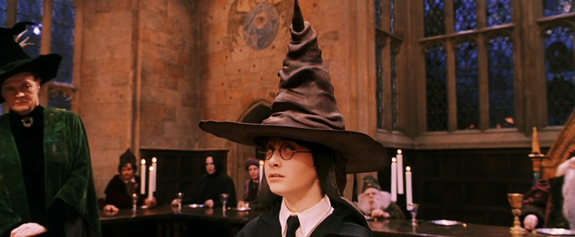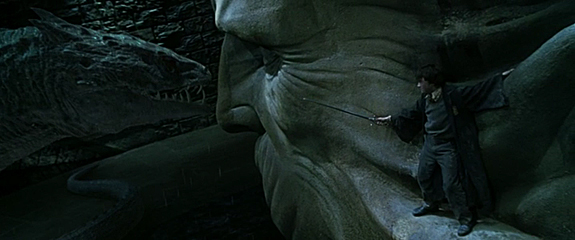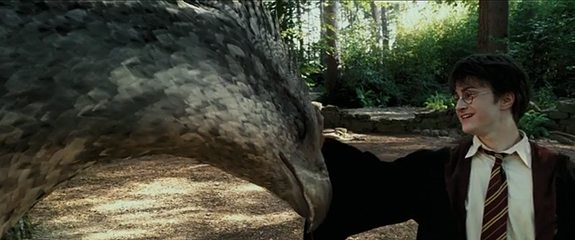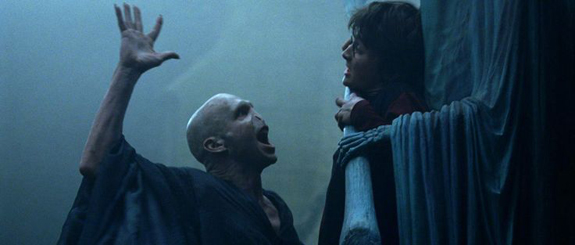
Many of the franchises that I have covered in this series usually evolved over many years, and sometimes decades, adapting to the times and taking interesting turns the further they went along. That wasn’t so much the case with the Harry Potter franchise. Based on author J.K. Rowling’s sprawling, seven volume epic series of novels, Harry Potter was a huge gamble for Warner Brothers to take on in the early 2000’s. They had to build a franchise around a cast of young characters in a genre that had, until that time, not clicked at the box office. And the big problem with planning such a long lasting franchise starring child actors is that they eventually grow up; fast. And yet, Warner Bros. benefited from having a source material with a built in audience that not only could work on the big screen, but in deed lended itself perfectly to the medium. Rowling’s grand magnum opus was a phenomenon that deserved all of it’s praise, and the pressure was on to make the films just as engaging as the books themselves, and do it quick (8 films in 10 years). As we know now, the franchise was a smash hit, and managed to fulfill it’s promise of capturing the full breadth of Rowling’s narrative. Following the titular hero on his adventures at the Hogwarts School of Wizarding and Witchcraft, the Potter franchise is both surprisingly faithful to the spirit of the novels, but distinctive in it’s own right as a cinematic achievement. Despite all it’s success, it wasn’t without some hurdles over time, especially in the beginning, but by the release of the eighth film in 2011 (Harry Potter and the Deathly Hallows Part 2), everyone could agree that this was one of the most monumental film franchises ever.
Because there is a lot to talk about with each film, I decided to do something different with this series and spread my discussion over two parts. For this first article, I will go over the first four films in the Harry Potter franchise, and then discuss the final four in the next entry of this series; hopefully before the release of the spin-off movie Fantastic Beasts and Where to Find Them this Thanksgiving. I’ll avoid going over plot summaries, since I’m sure that most of you already know these stories intimately by now. What I will write about is the way that the franchised progressed, movie by movie, and how this massive series built itself up to what it became in a relatively short amount of time. I will examine the development of the cast, the different visionary approaches to the same story, and more or less discuss how well each brought the world of J.K. Rowling’s universe to life. So now, let’s grab our brooms, don our robes, and hold out our wands as we look back at the franchise about the “boy who lived,” Harry Potter.

HARRY POTTER AND THE SORCERER’S STONE (2001)
Directed by Chris Columbus
So, a lot of anticipation led up to the premiere of this first Harry Potter film. Fans of the books couldn’t wait to see this story come to full life while, at the same time, were worried that it wasn’t going to live up to their imagination. The film certainly had a sizable budget behind it, as well as the backing of everyone at Warner Brothers, hoping the boy wizard would be the next big thing. And indeed, their gamble paid off, becoming a huge box office success and the highest grossing film of 2001, even in direct competition with Peter Jackson’s The Lord of the Rings, which was released only weeks after. But, here’s the thing; yes the movie was popular, but was it any good? The answer is, kind of. Unfortunately for Sorcerer’s Stone, in hindsight, it is universally viewed as the weakest film in the series, and it’s easy to see why. My own big problem with the movie is the fact that it’s not well directed. Chris Columbus has proven to be a fine producer over his many years in Hollywood, but his track record as a director is a bit shakier. Some of his movies are beloved (Home Alone); some are not (Pixels). While Harry Potter doesn’t represent Columbus’ worst work ever, it still shows a lot of his short-comings as a filmmaker. Namely, the fact that his movies lack any style to them. Sorcerer’s Stone is beautifully constructed, but the uninteresting cinematography and simplistic staging only reinforces the fact in the mind of the viewer that they are watching something shot on a soundstage, and not in a living, breathing world. Couple this with the fact that the movie is afraid to remove anything from the book, so you have a movie that feels both flat and bloated.
But, that’s not to say that the movie is a failure either. There is still plenty things to like and at times the film can be quite watchable and absorbing. Despite Chris Columbus’ short-comings as a director, I do give him credit for at least establishing all the pieces that would come to define the series in the years ahead and making them all appropriately iconic. Hogwarts is wonderfully realized, and effectively epic in scale. The production design overall is solid, with costumes, sets, and visual effects feeling all appropriately magical, if perhaps a little too basic. But, what’s most special about this movie, and for the franchise overall is the stellar, all-star cast. Many of Britain’s best character actors can all be found here, including Richard Harris as Professor Dumbledore, as well as Maggie Smith, Richard Griffiths, Robbie Coltrane, David Bradley, and John Hurt all giving their best. It should also be mentioned that they lucked out with the casting of Alan Rickman as Professor Snape, in what would be the greatest role of his stellar career, and a perfectly matched one too. But, it’s the casting of the main roles of the children where the movie really shines. Emma Watson and Rupert Grint click almost immediately in the crucial roles of Hermoine Granger and Ron Wesley respectively, and so do many of the other young stars. The only one who seems a little out of his league in this first film, unfortunately, is Daniel Radcliffe as Harry himself. I don’t see that as his fault, though, considering that he’s got to play the boring, every-man protagonist here, and I think that too much was expected of him so early on. He at least looked perfect for the role. As we would see in future movies ahead, his growth as an actor and his role as the character would take many unpredictable turns in the years ahead.

HARRY POTTER AND THE CHAMBER OF SECRETS (2002)
Directed by Chris Columbus
Filmed simultaneously with Sorcerer’s Stone, Harry Potter and the Chamber of Secrets made it to theaters exactly a year later. And while the movie improved on the original in some ways, it also sadly had some of the same problems. For one thing, the filmmakers seemed uncertain whether or not to cut moments from the book, so again they hedged their bets and included just about everything. This results in a movie that runs a staggering 162 minutes (the longest in the whole series) and you feel every bit of it. While it is neat to see so much time devoted to showcasing this amazing world, there are still plenty of things that could have been cut down. The Quidditch Match scene for example, while beautifully executed and epic in scope, goes on for way too long and could have done with a couple edits. Some of the plot detours could have used some better focus and time management too, like the whole Polyjuice Potion segment. Still, the movie does excel better than it’s predecessor. Chris Columbus manages to utilize his directorial tricks more effectively here, giving the movie a better cinematic look overall. He also manages to deliver on tone much better. The scenes within the Forbidden Woods and the titular Chamber are effectively creepy without feeling toned down. In addition, the film actually takes some chances by being shockingly violent at times, including a moment where Harry’s arm is brutally stabbed by the fang of a ferocious giant serpent. But, that’s not to say that the movie veers too quickly into darker territory. It’s still a film aimed at audiences of all ages (perhaps a little too much so) and it still retains an aura of wonderment overall.
Again, the cast is the shining element of this film. All the key players return, along with some welcome additions. Jason Issacs brings an appropriately menacing and sneering turn as the villainous Lucius Malfoy, father of hated Potter rival Draco (played by Tom Felton). My favorite addition to the cast though is Kenneth Branaugh as the pompous Professor Gilderoy Lockheart. The famed Shakespearean thespian and filmmaker delivers a delightfully hammy performance that enables him to steal every scene he’s in and it’s an overall inspired choice of casting. The child actors are also improved as well, especially Radcliffe as Harry, although he still hasn’t shaken off the bland, wide-eyed wonder expression that plagues his performance in these first couple films (seriously kid, it’s your second year at school; you should be used to this stuff by now). This was also sadly the final screen performance of actor Richard Harris, as this movie was released posthumously after his death in between films. He thankfully finished all his scenes before passing, and manages to deliver a wonderful swan song of a performance here. The movie is also notable for the introduction of Dobby, the series first fully CGI animated principle character. While he was annoying to some (mostly because he was unfairly compared to Lord of the Rings Gollum, who also was introduced that same year) the animation on the character was no less groundbreaking for it’s time and his presence helped to give this movie a much more magical feeling overall. It may not have been the fully realized Potter film we’ve been wanting to see just yet, but this entry nevertheless showed us that better things were to come for the franchise, and with Chris Columbus stepping aside as director, we would see that those better things were much closer than we expected.

HARRY POTTER AND THE PRISONER OF AZKABAN (2004)
Directed by Alfonso Cuaron
Now this is more like it. After Chris Columbus’ departure, Warner Brothers tapped Mexican filmmaker (and future Oscar-Winner) Alfonso Cuaron to direct the third feature in the series, and his input made a whole lot of difference. Cuaron proved to be a perfect choice because he brought a very distinct sense of style to the movie; something that would go on to define the rest of the series thereafter. The film no longer looked basic, but instead had visual flair to it. With artistic tricks like ink-blot transition fades, impressionistic framing, and Cuaron’s trademark long takes, this became a film that not only stood out from it’s predecessors, but also made Harry Potter distinctive from other films too. What Cuaron also did to change the face of the franchise was to take it out into the real world. Instead of shooting entirely around the vicinity of the studio lot that most of the original films were made in, Cuaron shot several exterior scenes on location in the Scottish Highlands. Because of this, the movie has an authenticity that the first two films didn’t. The universe of Harry Potter finally felt like a lived-in, functioning world, and that’s the biggest and most rewarding contribution Prisoner of Azkaban made to the franchise. At the same time, the film still feels like a natural continuation to what came before, and in addition to the great artistic leaps that this movie made, it also benefited from a renewed focus on the story. Prisoner of Azkaban finally delivers some much needed insight into Harry’s backstory, including the truth behind the murder of his family, and why his importance in this world matters.
Because of the more introspective details of this plot, it puts Harry’s personal journey more into the spotlight, and this in turn leads to one of the film’s other great improvements. For the first time in the series, Daniel Radcliffe finally shines as the character of Harry. He gives his best performance to date here, and I think that it’s because the series finally allows him to emote rather than react to what’s happening. It basically becomes a difference between performing and acting, and here, Radcliffe finally figured out how to embody the character. And it makes sense; Harry finally learns more about how the tragedies that shaped his life and how nothing is what it seems, making his inner turmoil all the more defining to his character. It also helps that Radcliffe had fantastic role models in the cast to help guide his acting abilities to new heights, such as the additions of Gary Oldman as Sirius Black and David Thewlis as Reamus Lupin, both giving standout performances. Also worth noting is the recasting of Dumbledore, with veteran actor Michael Gambon assuming the role after Richard Harris’ passing. While I admire Harris’ take on the character, I actually thing Gambon proved to be a better fit. Harris was a bit too ethereal as Dumbledore, while Gambon’s version came across as much more accessible, and a lot more natural as a result. The movie also makes the wise choice of cutting out any unnecessary scenes, making this movie feel much less bloated than previous films. Quidditch is portrayed to the bare minimum, and more time is devoted to the things that matter, like character relationships. While some things are curiously left out (the true authors of the Marauder’s Map) there’s nothing in this movie that shouldn’t be here, and that’s refreshing. Prisoner of Azkaban changed up the franchise in the best way possible, and that’s why it’s considered by most to be the best in the series.

HARRY POTTER AND THE GOBLET OF FIRE (2005)
Directed by Mike Newell
While I do admire Prisoner of Azkaban a great deal, and what it brought to the franchise as a whole, I actually would consider it’s successor to be my own favorite film in this series. Azkaban revolutionized and set the tone for the rest of the series, but I believe Goblet of Fire is the one movie that perfected it. My reaction may have to do with Goblet also being my favorite book from the series, but it’s not without a lot of remarkable film-making that helps to earn it that distinction as well. Director Mike Newell takes what Alfonso Cuaron built in the last movie, and amps it up to 11. The scale is bigger, with all the Triwizard Tournament sequences making a colossal impression; as does the impressive Quidditch World Cup that opens the feature. Not only that, but the characters themselves go through many life-altering changes. Romantic relationships come more into focus in this movie, with Harry finding his first crush in his fellow student Cho Chang (Katie Leung). Ron and Hermoine’s budding romance is also explored further, with sometimes very hilarious results. Conflicts between characters are also given more insight, as Harry begins to feel more of the pressure that his celebrity status in the Wizarding World and the negative effect it has. His friendship with Ron hits a few hurdles, as Harry seems to achieve glory without any effort and Ron sees it as a betrayal. I love all of this deeper stuff injected into the story, making the movie feel more than just a spectacle, but instead closer to the rich narrative that J.K. Rowling had imagined.
New members of the already stellar cast once again proves the ambitious casting choices of the series paying off so far. Brendan Gleeson delivers a delightfully unhinged performance as the curmudgeonly Mad Eye Moody, a character that both commands attention in every scene and brings some very welcome comic relief. Many other great British character actors bring plenty of flavor to the film as well, including Miranda Richardson as the nosy Rita Skeeter and Doctor Who‘s David Tennant delivering a very slimy performance as Barty Crouch Jr. Also, future sparkling vampire Robert Pattinson shows up as Hogwart’s resident hunk, Cedric Diggory. But, the film’s greatest addition to the series is the role that was probably the most crucial casting choice overall apart from Harry himself, and that’s the role of the primary villain; Lord Voldemort. After teasing his return for three movies, Voldemort finally shows his ugly face in the climax of this feature, and the filmmakers should be commended for getting someone as noteworthy as Ralph Fiennes for the role. Fiennes performance is iconic; both mesmerizing and terrifying at the same time. The way he goes from cool confidence to seething rage in an instant is frighteningly realized and the whole resurrection scene near the film’s end is easily one of the series finest moments, if not the best overall. Because of this dark turn, the franchise would likewise never be the same after this. The wizarding world would become a much darker place, where even Hogwarts would no longer be a safe haven, and the films commendably adopted that newer, darker tone gracefully.
So, there you have the first four features in the Harry Potter franchise. Unlike most series that tend to loose luster over time, Harry Potter is one of the few examples where it managed to get better the longer it went on. Much like how the children at it’s center grew up and matured, the series itself started off unfocused and uncertain, only to gain confidence as it kept growing. Sorcerer’s Stone and Chamber of Secrets are by no mean bad movies, but they do pale in comparison to where the series would ultimately go in the years after. I can’t stress enough how important Prisoner of Azkaban was in finally setting the tone for the series and helping to give it the distinctive character that it was lacking up to that point. But, when looked at entirely, you can’t deny that it does faithfully bring to life J.K. Rowling’s imaginative story; especially with regards to the characters. Just as with the novels themselves, I believe the real appeal of the Potter series is the incredible way that it perfectly captures the experience of childhood within a school environment. Sure, this a world of witches and wizards, but the interconnected relationships between characters are as real as anything we’ve all experienced when going through school. Just like all of us, Harry and his friends have to deal with the pressures of homework, the dangers of school bullying, as well as the reliance of friends in times of crisis. Rowling’s genius is in the fact that each of her novels is devoted to an entire school year, making the progression of the narrative feel familiar to any of us who recall our memories of school based on all the different levels of development we achieved. For the start of this franchise, we would see the sweet innocence and promise of youth give way to the harsh realities of adulthood just across the horizon, and that’s what awaits us in the final four films of the Harry Potter franchise. So, until then…
….to be continued.